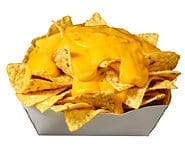A study published in the August 2001 issue of the Archives of Ophthalmology suggests that junk food may be bad for your eyesight. Fat-filled snack foods may heighten the risk of developing advanced age-related macular degeneration (AMD). Vegetable, monounsaturated and polyunsaturated fats, along with linoleic acid, are the types of fat that put junk food enthusiasts at higher risk for the eye disease. The foods that contain these fats are highly-processed, store-bought junk foods. Included in the study were: margarine; chocolate; commercially-prepared pie; cake and cookies; peanut butter; potato chips; french fries; and nuts. The study’s 349 subjects were between 55 and 80 years old and had advanced stages of AMD.
Higher intake of specific types of fat—including vegetable, monounsaturated, and polyunsaturated fats and linoleic acid—rather than total fat intake may be associated with a greater risk for advanced AMD. Diets high in omega-3 fatty acids and fish were inversely associated with risk for AMD when intake of linoleic acid was low (1).
![]()
Study Shows Snack Foods May Increase Risk of Age-Related Macular Degeneration, Fish May Decrease Risk
Contact: Mary E. Leach
(617) 573-4170
Boston (Aug. 14, 2001) – Higher consumption of specific types of dietary fat commonly found in snack foods may be associated with an increased risk of advanced age-related macular degeneration (AMD), the leading cause of blindness and vision impairment in the United States, according to a paper in the August issue of the Archives of Ophthalmology.
Johanna M. Seddon, M.D., lead author and director of Epidemiology at the Massachusetts Eye and Ear Infirmary, and co-authors found that a higher intake of specific types of fat, including vegetable, monounsaturated and polyunsaturated fats and linoleic acid may be associated with a greater risk for advanced AMD. Foods with higher levels of these fats overall tend to be highly processed, store-bought snack foods.
On the other hand, diets high in omega-3 fatty acids, which are primarily found in certain types of fish such as albacore tuna and salmon, were inversely associated with the risk for AMD when intake of linoleic acid found in processed and fast foods like potato chips and French fries was low, said Seddon.
“Since the impact of AMD on our growing elderly population is rising, finding means of prevention is of utmost importance. Thus far only cigarette smoking is a well-established, modifiable risk factor. Additional studies of dietary factors might lead to nutritional means to reduce the risk for development of this important disease among susceptible individuals,” Seddon said.
Based on the results of this study, the recommendations are to avoid highly processed snack foods and to consume two or more servings of fish high in omega-3 fatty acids per week to lower the risk of developing AMD.
The multi-center study took place at the Massachusetts Eye and Ear Infirmary, Manhattan Eye, Ear and Throat Hospital in New York, the Wilmer Eye Institute in Maryland, and the University of Illinois at Chicago.
Founded in 1824, the Massachusetts Eye and Ear Infirmary is an international center for treatment and research and a teaching hospital of Harvard Medical School. For more information, call 617.523.7900 or TDD 617.573.5498 or visitwww.masseyeandear.org. Boston Campus – 243 Charles Street, Boston, MA 02114
To our users: The information presented here is not intended to diagnose health problems or to take the place of professional medical care. If you have persistent health problems or if you have further questions, please consult your health care provider.
© 2000, 2001 Massachusetts Eye and Ear Infirmary

![]()
Blinded by Junk Food? Study Shows Snacks May be Bad for Vision
Aug. 15 — Junk food, long cited as the culprit in Americans’ expanding waistlines, may be bad for eyesight too, a new study suggests.
Fat-filled snack foods may heighten the risk of developing advanced age-related macular degeneration, the leading cause of blindness and vision impairment.
Overindulging in fat-filled snack foods may heighten the risk of developing advanced age-related macular degeneration, the leading cause of blindness and vision impairment in the United States for those over 55, researchers at the Massachusetts Eye and Ear Infirmary said in a new study. The irreversible eye disease affects the central vision of about 10 million Americans, and those numbers are expected to grow as Baby Boomers hit their mid-50s.
“What’s important about this study is that it shows for the first time, a link between diet and this problem,” ABCNEWS’ Dr. Nancy Snyderman told Good Morning America. “Before this, smoking was the only identified risk factor for macular degeneration. What the study shows is that specific types of fats, especially the kinds used in processed snack foods can increase your risk of age-related macular degeneration more than twofold.”
Chips, Cookies, Even Nuts on the List
Vegetable, monounsaturated and polyunsaturated fats, along with linoleic acid are the type of fats that put junk food enthusiasts at a higher risk for the eye disease, according to the study, published in the August issue of the Archives of Ophthalmology.
The foods that contain these fats are highly processed, store-bought junk foods. Included in the study: margarine, chocolate, commercially prepared pie, cake, cookies, peanut butter, potato chips, french fries and nuts. The study’s 349 subjects were between 55 and 80 years old and had advanced stages of age-related macular degeneration.
While snack foods were found to have negative impacts on vision, fish were found to be beneficial.
Fill up on Fish
The study found that diets high in omega-3 fatty acids, found primarily in albacore tuna and salmon, could lessen the risk for age-related macular degeneration, as long as fish eaters maintain a low intake of linoleic acid (found in processed food and margarine). A previous study also showed that dark, green leafy vegetables have the same impact.
Based on the new study, the researchers recommend avoiding highly processed snack foods and consuming two or more servings of fish high in omega-3 fatty acids.
Among those 75 and older, more than 25 percent have some signs of age-related macular degeneneration, and 6 percent to 8 percent have the advanced stages. It is incurable, and there is no proven treatment for the early and moderate forms of the disease. Those with later stage age-related macular degeneration have limited therapeutic options.
If your vision starts to change, especially if your central vision seems to have holes punched in it, go to a doctor immediately, Snyderman said.
Which Foods Should I Avoid?
- Eating right can help lower the risk of age-related macular degeneration. Here are some tips from ABCNEWS’ Dr. Nancy Snyderman:
- Avoid highly processed snack foods such as cakes, cookies, potato chips.
- Avoid partially hydrogenated fats, especially coconut oils.
- Eat a diet low in fat.
- Eat fish high in omega-3 fatty acids two to three times per week.
- Increase intake of green, leafy vegetables.
- Don’t smoke.
Copyright © 2001 ABC News Internet Ventures.
References
1. Dietary Fat and Risk for Advanced Age-Related Macular Degeneration,Johanna M. Seddon; Bernard Rosner; Robert D. Sperduto; Lawrence Yannuzzi; Julia A. Haller; Norman P. Blair; Walter Willett, Arch Ophthalmol. August 2001;119:1191-1199.

